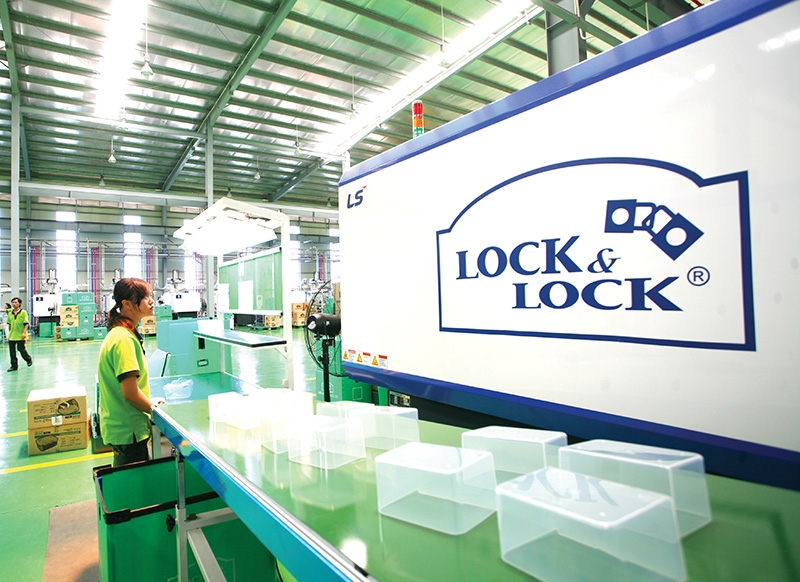Rolling out red carpet for South Korea
 |
| On the back of the RCEP, South Korean enterprises are expected to further increase investment in Vietnam, photo Le Toan |
Hundreds of South Korean enterprises participated in an investment promotion conference to lure investors into the northern province of Vinh Phuc organised last week by Vinh Phuc People’s Committee, the Ministry of Planning and Investment (MPI), and South Korean organisations already in Vietnam.
These enterprises had opportunities to meet local partners and work with authorities to scope out investment prospects in the province. The outcome of the conference is expected to open up opportunities for South Korean enterprises in industrial infrastructure development, manufacturing and processing, the supporting industry, innovation, and pharmaceuticals.
The Vinh Phuc promotional event was one of numerous similar events that South Korean investors have organised in cities and provinces across the country, in locations such as Nghe An, Ho Chi Minh City, Binh Duong, and Dong Nai. Several investment proposals worth hundreds of millions of US dollars have been made at the events, one of which was a $150 million technopark project in the southern province of Dong Nai proposed by Vietnam-Korea Techno Park, with the expectation to lure in $2-3 billion of high-tech investment in around 6-9 years of operation.
The strengthening of bilateral relations between Vietnam and South Korea has been a key mission of both and was once again repeated at the 18th Vietnam-Korea Economic Committee Meeting, hosted by the MPI and South Korea’s Ministry of Foreign Affairs last week.
Tran Quoc Phuong, Deputy Minister of Planning and Investment said, “Bilateral relations have acquired outstanding results in all sectors from investment and trade to tourism that create comprehensive benefits for both parties. South Korean enterprises have contributed an important part to Vietnam’s economy, which has made up 30 per cent of export turnover in the first nine months of this year.”
As of October 20, South Korea had about 8,900 valid projects in Vietnam with total registered capital of $70.4 billion, ranking first in total accumulated registered capital and project numbers from overseas investors. However, funding by Vietnamese counterparts into South Korea has been modest, with only 49 valid projects registered at $35.24 million.
This could all change in good time after the Regional Comprehensive Economic Partnership (RCEP) agreement, considered a catalyst to lure investment capital inflow from South Korea to Vietnam, was signed on November 15.
According to Minister of Industry and Trade Tran Tuan Anh, signing the RCEP will create more benefits for Vietnam in attracting foreign direct investment.
“In collaboration with other countries in ASEAN, Vietnam has opportunities to become a centre in luring such capital, especially from RCEP member countries,” he said.
According to newswire KBS, South Korea’s flagship broadcaster, the country’s administration described the RCEP signing as a “core result” of its New Southern Policy which aims to improve strategic ties with Southeast Asian nations.
Vietnam is evaluated as the key destination in South Korea’s New Southern Policy as Kim Hyun Chul, president of the New Southern Policy Committee, confirmed in the framework working session with Deputy Prime Minister Trinh Dinh Dung recently.
Chul said that the South Korean government will continue to encourage and create favourable conditions for its enterprises to invest in Vietnam in numerous sectors, including petrochemicals, renewable energy, and the environment.
In order to create favourable conditions for South Korean enterprises to develop projects in Vietnam, Lee Seong-ho, Deputy Minister for Economic Affairs, has proposed for Vietnam to resume commercial flights with South Korea and support their experts in entering the country to carry out vital work.
Do Van Su, general deputy director of the Foreign Investment Agency (FIA) under the MPI, said that the agency will cooperate with other authorities to deal with such proposals so that the projects in question can be implemented. “The FIA will also combine with local authorities to promote investment inflow from South Korea in sectors which save energy, use high-tech machinery, and which have a high localisation ratio,” Su said.
What the stars mean:
★ Poor ★ ★ Promising ★★★ Good ★★★★ Very good ★★★★★ Exceptional
 Tag:
Tag:
Related Contents
Latest News
More News
- Hermes joins Long Thanh cargo terminal development (February 04, 2026 | 15:59)
- SCG enhances production and distribution in Vietnam (February 04, 2026 | 08:00)
- UNIVACCO strengthens Asia expansion with Vietnam facility (February 03, 2026 | 08:00)
- Cai Mep Ha Port project wins approval with $1.95bn investment (February 02, 2026 | 16:17)
- Repositioning Vietnam in Asia’s manufacturing race (February 02, 2026 | 16:00)
- Manufacturing growth remains solid in early 2026 (February 02, 2026 | 15:28)
- Navigating venture capital trends across the continent (February 02, 2026 | 14:00)
- Motivations to achieve high growth (February 02, 2026 | 11:00)
- Capacity and regulations among British areas of expertise in IFCs (February 02, 2026 | 09:09)
- Transition underway in German investment across Vietnam (February 02, 2026 | 08:00)






















 Mobile Version
Mobile Version